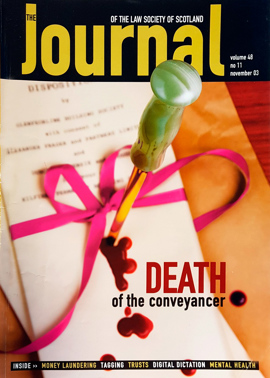Affidavits in undefended divorces
In January this year, the Inner House gave its decision in the latest round of the Ali litigation (Ali v Ali (No 3) 2003 FamLR 13). Readers may by now be familiar with the saga. The parties were divorced in Banff Sheriff Court in 1996. The divorce action had ultimately proceeded as undefended, Mr Ali having failed to lodge valuations of his matrimonial property. The affidavits lodged in support of decree did not deal with the financial order sought. Mrs Ali was awarded a capital sum of £70,000, payable immediately, together with interest and expenses. Mr Ali raised a petition for suspension and interdict in the Court of Session, arguing that the sheriff did not have sufficient evidence to justify the making of the capital sum order.
After seven years and three trips to the Inner House, the case is still unresolved. It became clear, following the second reclaiming motion (Ali v Ali (No 2) 2001 SC 618; 2001 SLT 602) that an application for financial provision in an undefended divorce must be supported by at least some evidence.
What remains less clear is the extent to which a pursuer, faced with a lack of co-operation on the part of the defender, requires to investigate the defender’s financial circumstances. To what lengths should the pursuer go in order to obtain formal valuations of the defender’s matrimonial property? What vouching needs to be produced? How much detail should the affidavits contain? There is obviously a balancing act to be observed: on the one hand, a pursuer will not wish to incur unnecessary costs on information surplus to the court’s requirements; on the other, the prospect of becoming embroiled in an Ali-type saga is not an edifying one.
Ali (No 2) provided some guidance in this topic, suggesting that a specification of documents would only be required “in the rarest case”. The latest Ali opinion provides some further insight into what a pursuer requires to do in order to safeguard an undefended decree.
Lord Nimmo Smith, who heard the proof before answer in the suspension petition, held that the capital sum order awarded to Mrs Ali by the sheriff had not been extravagant in the circumstances of the case. However, the Inner House took the view that the Lord Ordinary had focused too narrowly on the amount of the award. Other factors should also have been considered, namely Mr Ali’s ability to pay the capital sum immediately (not to mention interest and expenses) given the state of his health and his finances. In any event, the matrimonial debt outstanding at the date of separation had not been taken into account, with the result that Mrs Ali had received a greater than 50% share of the matrimonial property. The Inner House considered that any section 9(1)(b) argument should have been properly pled in the initial writ and fully dealt with in the affidavits.
It would appear that, at least in some circumstances, a pursuer’s affidavit ought to provide rather more than a summary of the matrimonial property. Where heritable property requires to be sold in order to satisfy a capital sum order, or where there exists any question as to the liquidity of the defender’s resources, the safe course of action must be to deal with these matters also in the affidavits.
Ali can be contrasted with another recent decision, that of Sullivan v Sullivan 2003 FamLR 53. This was an action of reduction of an undefended divorce decree granted in Glasgow Sheriff Court, which included a capital sum of £6,575 and periodical allowance until death or remarriage of £75 per week. The defender lived in England at the time the divorce action was raised. Neither he nor his English solicitors had taken any steps formally to defend the divorce action following service of the writ.
Mr Sullivan argued that the financial orders granted by the sheriff had been made on the basis of inadequate – and materially inaccurate – information. In particular, no formal valuation of the former matrimonial home had been lodged. Instead, the pursuer and her agent had estimated a figure. Other items of matrimonial property had been left out of the reckoning. The affidavits contained no evidence supporting an open-ended award of periodical allowance, even though the onus was on the pursuer to justify such an award.
Following proof, Lord Emslie granted decree of absolvitor. He held that the remedy of reduction was not available where decree had been granted as a result of inactivity on the part of the defender or his agents. However, he also held that the sheriff had been entitled on the strength of the evidence lodged in support of decree, to make the financial orders sought by the pursuer.
While it is difficult to distil a definitive set of guidelines from these decisions, it is always better to be safe than sorry, particularly in situations where supporting evidence can be produced at relatively little cost or inconvenience.
Rhona A Adams WS, Litigation Division, Morton Fraser
In this issue
- Big wheels keep on turning
- Outsourcing: trick or treat?
- The end of conveyancing as we know it
- A conflict of interest
- You’re tagged
- The beginning of the end
- The Scottish Law Commission’s Trust Law Review
- Disclosure: divorce lawyers and proceeds of crime
- Talking digital
- Keep an eye on your fee-earners
- Dot.com survivor!
- Determining place of payment
- Mental Health Act: care and treatment
- Affidavits in undefended divorces
- Scottish Solicitors’ Discipline Tribunal
- Jury trials in the Court of Session
- Website reviews
- Book reviews
- Preserving superiors’ rights
- Housing Improvement Task Force
- Land certificates: could this be yours?






